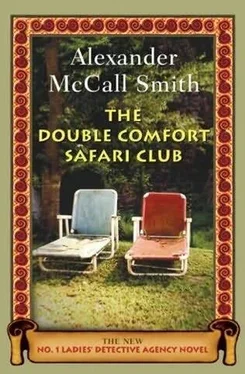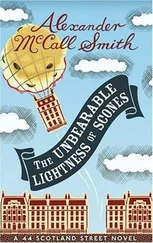“I will put it in the bank,” said Tebogo. “And then I will spend it later.”
“That sounds very wise,” said Mma Ramotswe.
“There are school fees for my son,” he went on.
Mma Ramotswe nodded her approval. “Yes, that would be a good thing to spend it on.”
“And my mother is very old,” Tebogo continued.
“Then you can make her comfortable,” said Mma Ramotswe.
“And I can buy some cattle for my cattle post.”
Mma Ramotswe thought that a good idea too. “That too. School fees, mother, and cattle. All of these are very fine purposes, Rra.”
Tebogo looked thoughtful. “I have just remembered something,” he said. “I have a letter from a lady in America. I still have it. It may be that lady, that Mma Grant.”
Mighty explained that this was quite common. “People often write to us,” he said. “They write to thank us, or they send us a postcard to show where else they have been.”
“I keep all these things,” said Tebogo. “Would you like to see it? I can go and fetch it from my place. I think I know where it will be.”
Mma Ramotswe said that she would, and Tebogo walked off to the staff quarters to fetch the letter. A few minutes later he returned, clutching a large envelope. From this he drew out a typed letter to which was attached a couple of newspaper cuttings and a photograph.
“This is what she sent me,” he explained. “Those pages from the newspaper are about a man from her home town who was breeding ostriches. I had showed her some ostriches, and she thought I might be interested in that. And there is a photograph of me and her standing together outside the camp. I remember this lady. I had just forgotten that she was called Mma Grant.”
He was clearly exhilarated by the news that Mma Ramotswe had given him, and he spoke quickly, the excitement showing in his voice. Mma Ramotswe took the sheaf of papers from him, and looked at the press cuttings. She found it touching that a woman like Mrs. Grant, who lived so far from the world of this man, should have sent him things to read from her newspaper. But that was how people were: they reached out to one another, no matter what dividing chasms lay between them-chasms of geography, and nation, and language; in spite of all these, people could still look at others and see that we were all the same, at least in those things that mattered, those things of the spirit, of the heart-human things.
“Ostriches,” she muttered.
“Yes,” said Tebogo. “I have read the articles. It is very interesting. But I felt a bit sorry, Mma.”
Mma Ramotswe looked up sharply. “Sorry for Mma Grant?”
He shook his head. “No, for the ostriches. They are so far away from Africa. They are living in a cold place. They must be very sad.”
“They do not know about any of that,” said Mma Makutsi firmly. “An ostrich that is born in another place does not know about Africa. And they do not have very big heads, Rra. So they do not know where they are.”
Tebogo gave Mma Makutsi a challenging look. “Animals and birds know exactly where they are,” he said reproachfully. “They know many things, Mma.”
Mma Ramotswe folded up the ostrich articles and detached the photograph from the letter. “So this is…” She stopped. She had seen a photograph of Mrs. Grant in the obituary that the lawyer had sent her. The late Mrs. Grant was thin, even gaunt. This Mrs. Grant was by contrast traditionally built. The late Mrs. Grant had grey hair, cut short, and a prominent nose. This Mrs. Grant had blonde, shoulder-length hair and a very small nose. They were not the same person; she had absolutely no doubt about it.
CHAPTER SIXTEEN. MOST UNFORTUNATE
IT WAS FORTUNATE that Mma Makutsi chose this moment of dismaying discovery to engage Tebogo in conversation about the antics of the monkey in the tree above them. The monkey, which had been joined by three or four of its troop, was chattering excitedly, competing with its fellows over some morsel it had found in the higher branches. Leaving her assistant, Mma Ramotswe took Mighty to one side.
“There is something wrong,” she whispered.
Mighty drew in his breath. “You don’t think he deserves the money?”
“No. It’s not that. It’s the wrong person.”
Mighty looked puzzled. Glancing over his shoulder to check that they could not be overheard by Tebogo, he assured her that there was no question but that Tebogo had looked after Mrs. Grant. “It is in the book,” he said. “And he remembers her.” He gestured to the letter. “That letter is signed by Mrs. Grant, isn’t it? Yes, look at it. That says Grant.”
Mma Ramotswe frowned. “I know,” she whispered. “I know that. But that lady in the picture is not Mrs. Grant. I have her photograph with my things in the room. I’ll show you, if you like. That is not the lady.”
Mighty made a gesture of helplessness. “I don’t see how this can be,” he said.
Mma Ramotswe fiddled anxiously with the papers. “I don’t know what to do,” she said. “I cannot pay the money to the wrong man. I have my duty to Mrs. Grant’s lawyer, a certain Mr. Maxwell. He is my client, Rra. Can you see that?”
Mighty nodded, again looking furtively at Tebogo. “I understand, Mma. But I just don’t see how this can be. A lady called Mrs. Grant came to this camp…”
Mma Ramotswe took hold of his forearm. “Hold on, Rra. You said that a lady called Mrs. Grant came to the camp…”
“I did. And I have already shown you the evidence of that.”
Mma Ramotswe drew him further away from the other two, who were still engaged in their observation of the monkeys. “A lady called Mrs. Grant,” said Mma Ramotswe. She spoke slowly and deliberately, as if testing each word. “Do you think that Grant is a common name, Rra? I’ve certainly seen it before. Have you?”
Mighty considered this. “I think so,” he said. “We’ve had other Grants before. Maybe it’s a common name in America, like… like Tebogo in Botswana. Or Ramotswe…”
Mma Ramotswe smiled, but did not let the joke distract her. “You’ve had other Grants before, you say. But not at the same time.”
“No, not at the same time.”
It was all falling into place. “Mighty,” she said, “what if there were two Mma Ramotswes? Or two Mma Grants?”
Mighty frowned. “Two Mma Ramotswes?” He stared at her, and then he put his hand to his cheek and stroked it. “Oh,” he said. Then, “Oh,” again.
“Oh,” echoed Mma Ramotswe. She looked in his eyes. He was a sharp-witted man. He understood. But there was one final piece of the jigsaw to fit into place. “Can you think of another camp with an animal in its name?”
Mighty answered quickly. “Our neighbour,” he said. “Three miles away. Lion’s Tail Camp.”
“Can you take me there?” asked Mma Ramotswe.
Mighty looked doubtful. “Right now?”
“Yes. Right now, Rra.”
“It’s getting late. We’ll have to go by boat.”
“I’m ready to go.”
Mighty still looked worried. “I don’t like to travel on the water at night. It would be dark by the time we came back.”
“Give me a torch,” said Mma Ramotswe. “I shall sit in the front and shine it ahead of us. If there are any hippos, we shall see their eyes in the beam of the torch.”
“You are a brave lady, Mma. Maybe that is why you’re a detective.”
Mma Ramotswe laughed. “I am no braver than anybody else.” Was that true? she wondered. There was Mma Makutsi, after all… “I think that I shall leave my assistant back here. I don’t think that she will want to come.”
WITH MIGHTY’S EXPERT NAVIGATION through the spreading channels of the Delta, it took them barely half an hour to reach Lion’s Tail Camp. It was a more modest camp than Eagle Island, with smaller, tented rooms for the visitors, but still with that stylish old-safari feel that Botswana did so well. The manager was away in Maun, but the head guide, Moripe Moripe, an old friend of Mighty, greeted them warmly and listened attentively to Mma Ramotswe’s story. As her explanation drew to a close, he started to nod encouragingly.
Читать дальше












